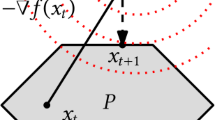Abstract
We develop a general approach to convergence analysis of feasible descent methods in the presence of perturbations. The important novel feature of our analysis is that perturbations need not tend to zero in the limit. In that case, standard convergence analysis techniques are not applicable. Therefore, a new approach is needed. We show that, in the presence of perturbations, a certain ε-approximate solution can be obtained, where ε depends linearly on the level of perturbations. Applications to the gradient projection, proximal minimization, extragradient and incremental gradient algorithms are described.
Similar content being viewed by others
References
Luo, Z. Q., and Tseng, P., Error Bounds and Convergence Analysis of Feasible Descent Methods: A General Approach, Annals of Operations Research, Vol. 46, pp. 157–178, 1993.
Goldstein, A. A., Convex Programming in Hilbert Space, Bulletin of the American Mathematical Society, Vol. 70, pp. 709–710, 1964.
Levitin, E. S., and Polyak, B. T., Constrained Minimization Methods, USSR Computational Mathematics and Mathematical Physics, Vol. 6, pp. 1–50, 1965.
Martinet, B., Regularisation d'Inéquations Variationelles per Approximations Successives, RAIRO-Operations Research, Vol. 4, pp. 154–159, 1970.
Rockafellar, R. T., Monotone Operators and the Proximal Point Algorithm, SIAM Journal on Control and Optimization, Vol. 14, pp. 877–898, 1976.
Korpelevich, G. M., The Extragradient Method for Finding Saddle Points and Other Problems, Matecon, Vol. 12, pp. 747–756, 1976.
Marcotte, P., Application of Khobotov's Algorithm to Variational Inequalities and Network Equilibrium Problems, Information Systems and Operational Research, Vol. 29, pp. 258–270, 1991.
Solodov, M. V., Incremental Gradient Algorithms with Stepsizes Bounded Away from Zero, Technical Report B-096, Instituto de Matematica Pura e Aplicada, Jardim Botanico, Rio de Janeiro, Brazil, 1995.
Mangasarian, O. L., Convergence of Iterates of an Inexact Matrix Splitting Algorithm for the Symmetric Monotone Linear Complementarity Problem, SIAM Journal on Optimization, Vol. 1, pp. 114–122, 1991.
Luo, Z. Q., and Tseng, P., Error Bound and Convergence Analysis of Matrix Splitting Algorithms for the Affine Variational Inequality Problem, SIAM Journal on Optimization, Vol. 2, pp. 43–54, 1992.
Li, W., Remarks on Matrix Splitting Algorithms for Symmetric Linear Complementarity Problems, SIAM Journal on Optimization, Vol. 3, pp. 155–163, 1993.
Solodov, M. V., New Inexact Parallel Variable Distribution Algorithms, Computational Optimization and Applications, (to appear).
Dembo, R. S., Eisenstat, S. C., and Steihaug, T., Inexact Newton Methods, SIAM Journal on Numerical Analysis, Vol. 19, pp. 400–408, 1982.
Polyak, B. T., Introduction to Optimization. Optimization Software, Publications Division, New York, New York, 1987.
Polak, E., Computational Methods in Optimization: A Unified Approach, Academic Press, New York, New York, 1971.
Boggs, P. T., and Dennis, J. E., A Stability Analysis for Perturbed Nonlinear Iterative Methods, Mathematics of Computation, Vol. 30, pp. 199–215, 1976.
Mangasarian, O. L., and Solodov, M. V., Serial and Parallel Backpropagation Convergence via Nonmonotone Perturbed Minimization, Optimization Methods and Software, Vol. 4, pp. 103–116, 1994.
Mangasarian, O. L., and Solodov, M. V., Backpropagation Convergence via Deterministic Nonmonotone Perturbed Minimization, Neural Information Processing Systems, Edited by G. Tesauro, J. D. Cowan, and J. Alspector, Morgan Kaufmann Publishers, San Francisco, California, Vol. 6, pp. 383–390, 1994.
Zavriev, S. K., Convergence Properties of the Gradient Method under Variable Level Interference, USSR Computational Mathematics and Mathematical Physics, Vol. 30, pp. 997–1007, 1990.
Solodov, M. V., and Zavriev, S. K., Error-Stability Properties of Generalized Gradient-Type Algorithms, Mathematical Programming Technical Report 94-05, Computer Science Department, University of Wisconsin, Madison, Wisconsin, 1994 (Revised 1995).
Luo, Z. Q., and Tseng, P., Analysis of an Approximate Gradient Projection Method with Applications to the Backpropagation Algorithm, Optimization Methods and Software, Vol. 4, pp. 85–101, 1994.
Mangasarian, O. L., Nonlinear Programming, McGraw-Hill, New York, New York, 1969.
Robinson, S. M., Some Continuity Properties of Polyhedral Multifunctions, Mathematical Programming Study, Vol. 14, pp. 206–214, 1981.
Luo, Z. Q., Mangasarian, O. L., Ren, J., and Solodov, M. V., New Error Bounds for the Linear Complementarity Problem, Mathematics of Operations Research, Vol. 19, pp. 880–892, 1994.
Pang, J. S., A Posteriori Error Bounds for the Linearly-Constrained Variational Inequality Problem, Mathematics of Operations Research, Vol. 12, pp. 474–484, 1987.
Luo, X. D., and Tseng, P., On Global Projection-Type Error Bound for the Linear Complementarity Problem, Linear Algebra and Its Applications, (to appear).
Zangwill, W. I., Nonlinear Programming: A Unified Approach, Prentice-Hall, Englewood Cliffs, New Jersey, 1969.
Gafni, E. M., and Bertsekas, D. P., Two-Metric Projection Methods for Constrained Optimization, SIAM Journal on Control and Optimization, Vol. 22, pp. 936–964, 1984.
Rockafellar, R. T., Convex Analysis, Princeton University Press, Princeton, New Jersey, 1970.
Mangasarian, O. L., Mathematical Programming in Neural Networks, ORSA Journal on Computing, Vol. 5, pp. 349–360, 1993.
Bertsekas, D. P., Incremental Least Squares Methods and the Extended Kalman Filter, SIAM Journal on Optimization, Vol. 6, pp. 807–822, 1996.
Bertsekas, D. P., A New Class of Incremental Gradient Methods for Least Squares Problems, Report, Department of Electrical Engineering and Computer Science, Massachusetts Institute of Technology, Cambridge, Massachusetts, 1995.
Luo, Z. Q., On the Convergence of the LMS Algorithm with Adaptive Learning Rate for Linear Feedforward Networks, Neural Computation, Vol. 3, pp. 226–245, 1991.
Tseng, P., Incremental Gradient(-Projection) Method with Momentum Term and Adaptive Stepsize Rule, Report, Department of Mathematics, University of Washington, Seattle, Washington, 1995.
Solodov, M. V., and Tseng, P., Modified Projection-Type Methods for Monotone Variational Inequalities, SIAM Journal on Control and Optimization, Vol. 34,No. 5, 1996.
Tseng, P., On Linear Convergence of Iterative Methods for the Variational Inequality Problem, Journal of Computational and Applied Mathematics, Vol. 60, pp. 237–252, 1995.
Author information
Authors and Affiliations
Rights and permissions
About this article
Cite this article
Solodov, M.V. Convergence Analysis of Perturbed Feasible Descent Methods. Journal of Optimization Theory and Applications 93, 337–353 (1997). https://doi.org/10.1023/A:1022602123316
Issue Date:
DOI: https://doi.org/10.1023/A:1022602123316




